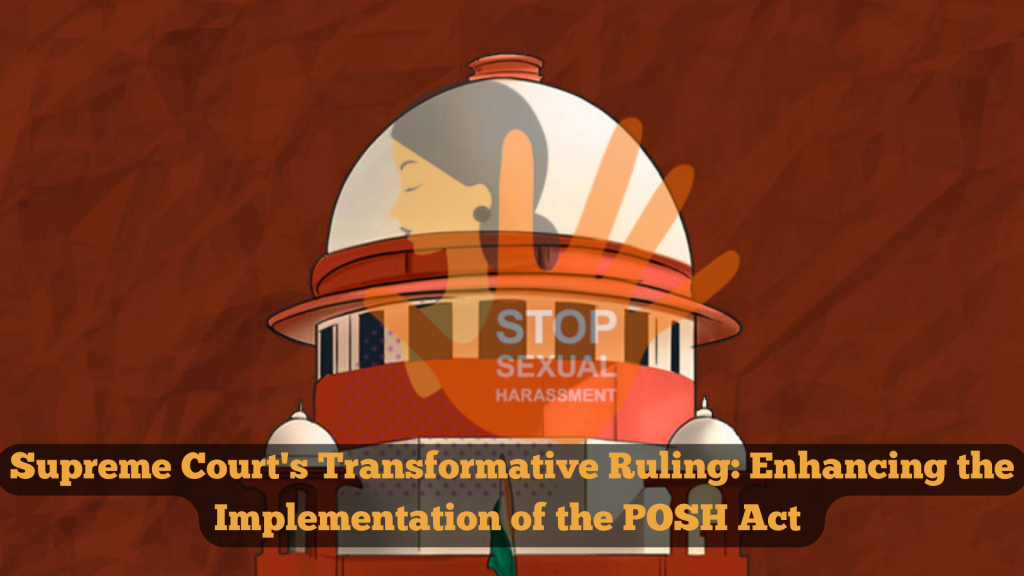
Supreme Court’s Transformative Ruling: Enhancing The Implementation Of The POSH Act
Judgement Given On : 12/05/2023
Background of Aureliano Fernandes v. State of Goa:
The case of Aureliano Fernandes, an employee of Goa University, triggered the Supreme Court’s intervention. Multiple complaints of sexual harassment were filed against him by female students, leading to an internal inquiry by the university. The case eventually reached the Supreme Court and set a precedent for handling similar cases, particularly concerning the implementation of the POSH Act.
Significance of Supreme Court’s Intervention:
The recent intervention by the Supreme Court in Aureliano Fernandes v. State of Goa has drawn fresh attention to the POSH Act. Despite its existence for a decade, the Act has faced challenges in effective implementation. The Court’s directives seek to address these issues by issuing comprehensive guidelines to bolster the Act’s efficacy.
Role of Goa University’s Internal Committee:
Following the POSH Act’s mandate, Goa University formed an Internal Committee (IC) to investigate the allegations against Fernandes. The IC initiated proceedings, but due to Fernandes’ repeated absence during the inquiry, it issued an ex-parte order. The committee concluded that his actions amounted to grave misconduct, recommending his termination. This pivotal decision prompted Fernandes to challenge the IC’s findings in the High Court.
High Court’s Decision and Implications:
Fernandes filed a writ petition in the Bombay High Court (Goa Bench), contesting the IC’s decision on several grounds, including inadequate opportunities to defend himself and improper committee constitution. However, the High Court upheld the IC’s decision, dismissing Fernandes’ claims. It affirmed the IC’s actions and the prevailing procedures under the POSH Act. The case eventually reached the Supreme Court, leading to a reevaluation of the Act’s efficacy and the procedures followed by internal committees.
Supreme Court’s Observations:
The Supreme Court took a critical stance on the inquiry process conducted by Goa University’s Internal Committee. It found that the proceedings were rushed and failed to afford Aureliano Fernandes an adequate opportunity to defend himself. The Court highlighted that such haste undermined the integrity of the inquiry process and violated principles of natural justice. The judgment emphasized the importance of natural justice, underscoring that adherence to these principles is non-negotiable, even in cases of sensitive nature like sexual harassment.
Supreme Court’s Concerns About POSH Act Enforcement:
The Supreme Court expressed grave concerns about the current state of POSH Act enforcement. Despite a decade in existence, the Act has not been effectively implemented, leading to enforcement gaps. The Court noted that these gaps not only involve procedural issues but also undermine the Act’s fundamental purpose—to create a safe working environment for women. The Court’s observations highlight the pressing need for a comprehensive review and overhaul of the mechanisms governing the Act’s implementation.
Key Directives by the Supreme Court:
The Supreme Court issued several directives to rejuvenate the POSH Act’s implementation:
Time-Bound Assessment for LCs/ICs:
- The Court called for a time-bound assessment to verify the constitution and functioning of Local Committees (LCs) and Internal Committees (ICs). Ministries, departments, government organizations, and public sector undertakings at the Union and State levels must conduct this assessment to ensure compliance with POSH Act provisions.
Transparency and Accessibility:
- The Court emphasized the need for transparency and easy accessibility of information related to LCs and ICs. It mandated that all relevant details, including committee constitution, composition, and contact information, as well as the procedure for filing online complaints, should be readily available on official websites. This information must be regularly updated to maintain transparency.
Training and Familiarization:
- Recognizing the significance of well-prepared committee members, the Supreme Court directed the initiation of training programs. These programs aim to familiarize LC and IC members with their roles and responsibilities, ensuring their competence in handling the complexities of sexual harassment cases.
Orientation Programs and Awareness Campaigns:
- The Court stressed the importance of education and awareness by mandating regular orientation programs, workshops, seminars, and awareness campaigns. These initiatives aim to enhance the skills of LC and IC members and educate women employees and women’s groups about the POSH Act’s provisions and relevant regulations.
Implications for the Public Sector:
The Supreme Court’s directives have immediate implications for the public sector, necessitating swift compliance with the new guidelines. Ministries, departments, government organizations, and public sector undertakings must conduct a timely assessment to confirm LC and IC constitution and functionality. Additionally, they are mandated to make committee-related information easily accessible online. Training programs must be initiated to equip committee members for their roles.
Challenges in Implementation:
Despite clear directives, the public sector faces challenges in implementation. Bureaucratic inertia, resource constraints, and limited awareness about the POSH Act can hinder progress. Moreover, the public sector’s diverse nature makes uniform implementation complex. Remote areas may lack the infrastructure for online training or information accessibility. Overcoming these challenges requires innovative solutions and a multi-faceted approach.
Conclusion:
The Supreme Court’s landmark judgment in Aureliano Fernandes v. State of Goa represents a pivotal moment in addressing workplace harassment in India. Its directives offer a roadmap for organizations to enhance POSH Act compliance. However, successful implementation hinges on adapting these guidelines to the unique needs of various organizations.
The judgment underscores that combating workplace harassment is a collective responsibility. It requires active participation from lawmakers, employers, employees, civil society, and technology providers. While challenges persist, the Court’s intervention injects urgency and focus into this crucial issue, offering hope for a safer, more respectful work environment. Ultimately, the judgment serves as a guide and a call to action, challenging all stakeholders to create workplaces where dignity and respect are paramount.
